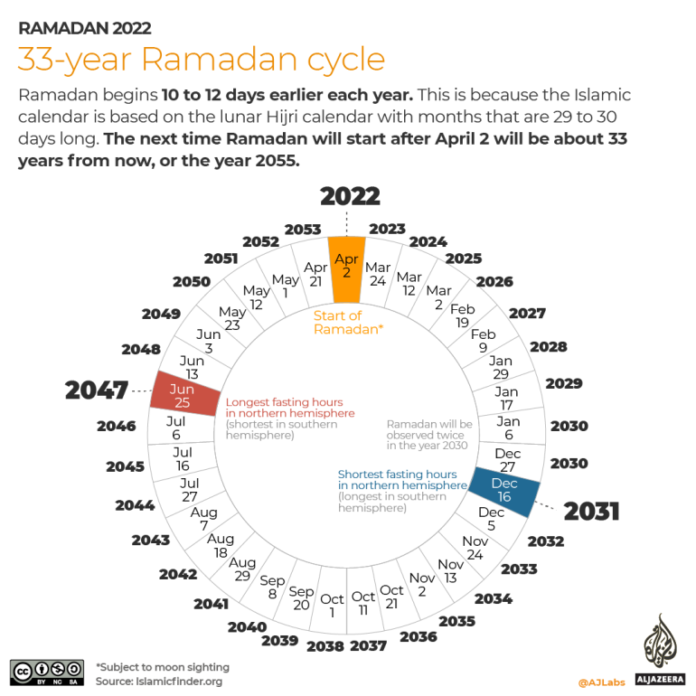Finally, the holy month of Ramadan has entered its second week. The pre-sunrise to sunset fast lasts anywhere from 10 to 19 hours, but it depends on where in the world you are.
The fast entails celibacy from eating, drinking, smoking and sexual relations to gain greater “taqwa”, or blessings of God.
Ramadan starts 10 to 12 days before each year. This is because the Islamic calendar is dependent on the lunar Hijri calendar with 29 to 30 days long months. Because the lunar year is shorter as compared to the solar year by 11 days, this means that Ramadan will also be honoured twice in the year 2030 – first on January 6 and then repeat on December 27 – depending on the time of sighting the moon. The next time Ramadan will start after April 2 will be about 33 years from now, or the year 2055.
The number of daylight hours depends from country to country. Muslims who are living in the world’s southmost countries, such as Chile and New Zealand, will have to fast for an average of 11 to 12 hours. However, those who are living in countries like Iceland and Greenland will have a 17+ hour fast.
For Muslims who are living in the Northern Hemisphere, the number of fasting hours will be a tad shorter in 2022 and will continue to decrease until 2031, which is this year Ramadan will encompass the winter solstice, the shortest day of the year. After that, fasting hours will be going to increase in summers – the longest day of the Northern year. For Muslims who are living in the south of the equator, the opposite will happen.
In severe northernmost cities like Longyearbyen, Norway, where the sun does not set from April 20 to August 22, religious rulings have been given to follow timings in Mecca, Saudi Arabia, or the nearest Muslim country.
Here are the average number of fasting hours in cities around the world. Actual fasting hours and times will change by the day, as well as calculation methods:
– Nuuk, Greenland: 18-19 hours
– Reykjavik, Iceland: 17-18 hours
– Helsinki, Finland: 16-17 hours
– Stockholm, Sweden: 16-17 hours
– Glasgow, Scotland, UK: 16-17 hours
– Amsterdam, the Netherlands: 15-16 hours
– Warsaw, Poland: 15-16 hours
– London, UK: 15-16 hours
– Paris, France: 15-16 hours
– Nur-Sultan, Kazakhstan: 15-16 hours
– Brussels, Belgium: 15-16 hours
– Zurich, Switzerland: 14-15 hours
– Bucharest, Romania: 14-15 hours
– Ottawa, Canada: 14-15 hours
– Sofia, Bulgaria: 14-15 hours
– Rome, Italy: 14-15 hours
– Madrid, Spain: 14-15 hours
– Lisbon, Portugal: 14-15 hours
– Athens, Greece: 14-15 hours
– Beijing, China: 14-15 hours
– Washington, DC, US: 14-15 hours
– Pyongyang, North Korea: 14-15 hours
– Ankara, Turkey: 14-15 hours
– Rabat, Morocco: 14-15 hours
– Tokyo, Japan: 14-15 hours
– Islamabad, Pakistan: 14-15 hours
– Kabul, Afghanistan: 14-15 hours
– Tehran, Iran: 14-15 hours
– Baghdad, Iraq: 14-15 hours
– Beirut, Lebanon: 14-15 hours
– Damascus, Syria: 14-15 hours
– Cairo, Egypt: 13-14 hours
– Jerusalem: 13-14 hours
– Kuwait City, Kuwait: 13-14 hours
– Gaza City, Palestine: 13-14 hours
– New Delhi, India: 13-14 hours
– Hong Kong: 13-14 hours
– Dhaka, Bangladesh: 13-14 hours
– Muscat, Oman: 13-14 hours
– Riyadh, Saudi Arabia: 13-14 hours
– Doha, Qatar: 13-14 hours
– Dubai, UAE: 13-14 hours
– Aden, Yemen: 13-14 hours
– Addis Ababa, Ethiopia: 13-14 hours
– Dakar, Senegal: 13-14 hours
– Abuja, Nigeria: 13-14 hours
– Colombo, Sri Lanka: 13-14 hours
– Bangkok, Thailand: 13-14 hours
– Khartoum, Sudan: 13-14 hours
– Kuala Lumpur, Malaysia: 13-14 hours

